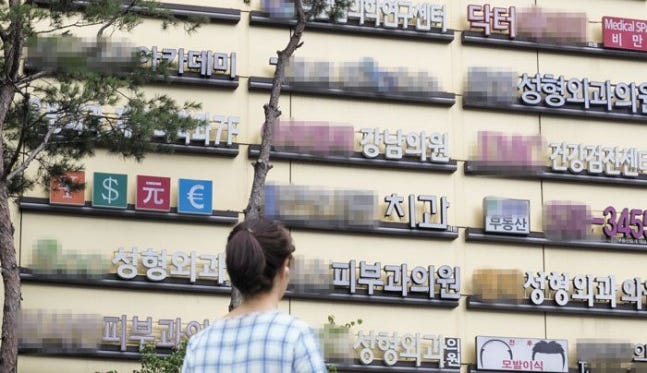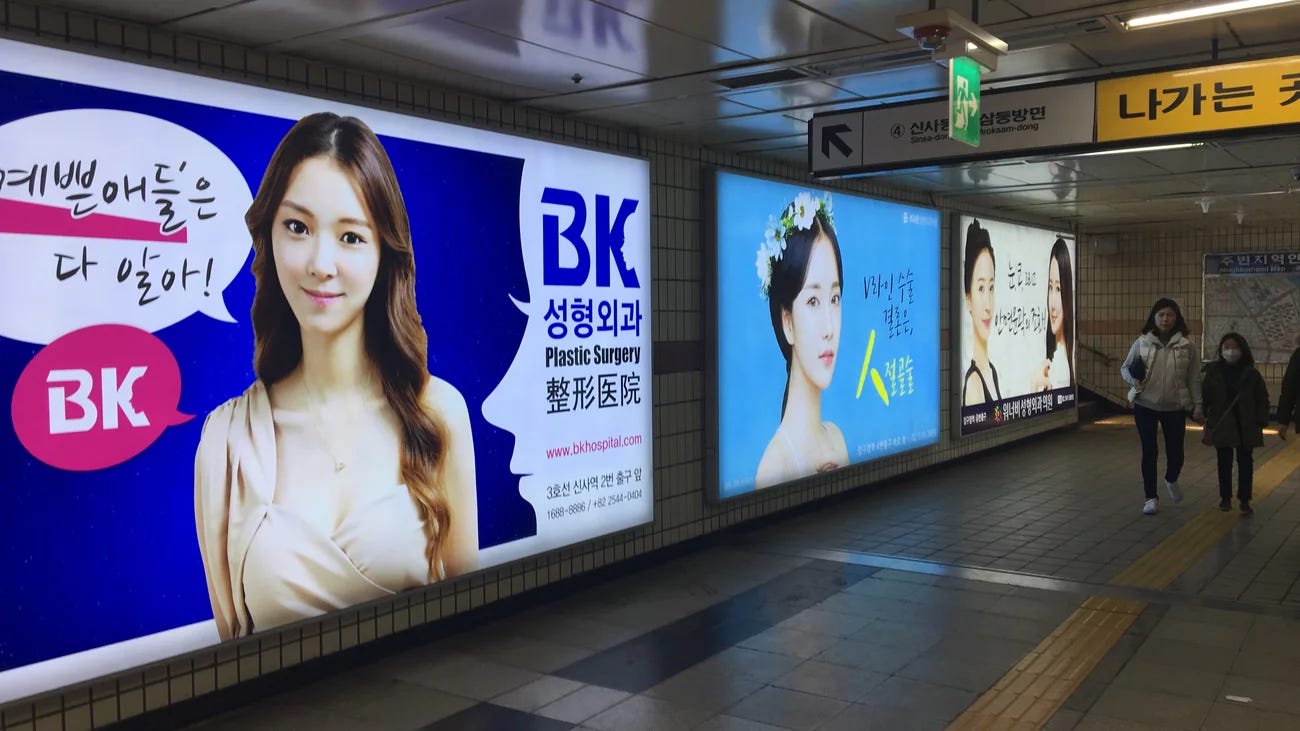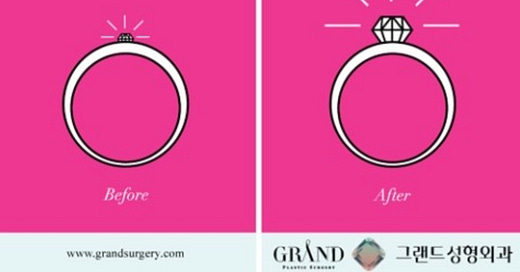“I got Titanium done recently,” a friend said nonchalantly as we were having a girls lunch.
“What’s that?” I asked, confused by this sudden mention of what sounded like a car fixture.
“It’s a lifting procedure. I can’t bear to look at my sagging face in the mirror anymore,” continued my gorgeous 40-year-old friend who looks 25.
Welcome to Seoul, aka the world capital of plastic surgery. Capital, because South Korea currently performs 24% of worldwide plastic surgeries. Some data also estimate that 50%+ of Korean women, aged 19-40, have received cosmetic procedures, a figure not surprising, considering that every single casual conversation with my female friends converges to the topic of cosmetic surgery.
The obsession with physical appearance in Korea stems from the culturally-rooted belief that facial physiognomy influences one’s destiny - like one’s job, spouse, and wealth. A face is deemed to manifest a person’s character, habits, temperament, therefore, to steer the course of one’s life. So fortune tellers read faces like they read Tarot cards: the shape of the eyes, the width between the eyes, the line of the nose, the size of the mouth, the thickness of the eyebrows… Gwansang (face-contemplation), the custom is called. Whereas one had to live with one’s flaws before, nowadays, thanks to technology, destiny can be engineered by re-sculpting facial errors.
A fast fix of one’s fate. The idea perfectly encapsulates Korea’s highly competitive and ppali-ppali (fast-fast) culture that demands immediate results over anything else. The driving force behind our miraculous economic growth after the decimating Korean War, a mentality that enabled our fast-fast catch-up with the rest of the world. But with prosperity, this competitive mindset has evolved into: ‘if my friends look young and pretty, I must look younger and prettier.’ Because, presumably, the prettier one is, the richer one will marry. The better looking one is, the better one’s job will be. So it is not unusual for young women (and men) to revert to plastic surgery before spouse-hunting or job interviews. Mothers even “gift” their daughters with cosmetic procedures before they enter university. As a result, Korean women are generally pretty and ageless. But their perfectly-shaped faces look so similar to one another that, more than once, I have embarrassed myself by mistaking one person for another, or by re-introducing myself to someone I had already met. The dissipation of characteristics makes me feel like I live in a world of digital avatars.
Indeed, cosmetic surgeries now bear techno-swanky nomenclatures fitting for an avatar-universe, like “Titanium lifting,” “Air lifting,” or “V-line modeling.” And tonics of youth range far beyond simple Botox into “Chanel injections”, “Cinderella boosters”, and “White Jade drips” that allegedly make one’s face as sleek as Chanel bags and as pristine as porcelain dolls. Medical technology offers all sorts of rejuvenating, tightening, shaping, and volumizing wonders to sculpt one’s face exactly as one desires it. Aging and ugliness have become an option.
For the skeptics doubting the pervasiveness of cosmetic surgeries in Korea, it only takes a quick stroll in the Gangnam district (of Psy’s Gangnam Style) to get the proof. Building facades are crammed with signs of plastic surgery clinics. Hovering above the roads are screens advertising the newest skin rejuvenation procedures. And until very recently, subway stations were filled with billboard-sized advertisements of plastic surgeons (banned after growing complaints by the riders) with before and after pictures of women boasting captions like “You Can Change Your Life.” And it is not unusual to hear people with bandaged faces speak foreign languages on the phone because medical tourism is a profitable business model.


“You have to start taking care of yourself now, Jisoo. What are you going to do in a few year’s time? Age builds up,” colleagues, friends, and distant family members have told me over the years. And as subtly too, because I have otherwise been advised that if I made my eyes bigger, my nose more erect, or put myself in slimming centers, I’d look much prettier. Taking offense at these comments would be silly because, here, giving cosmetic advice is equivalent to sharing tips on window treatments for an apartment renovation. But, because I’ve spent most of my life outside Korea, the universe of facial engineering lies so far outside my orbit of existence that I just shrug my shoulders and give a polite, forced smile.
After all, what is so wrong about using some tricks and potions to keep us young and beautiful? Humankind’s quest for the Fountain of Youth has been endless. And now that we have found it, isn’t it stupid not to drink from it?
Perhaps. But I am reminded of The Picture of Dorian Gray here. Oscar Wilde’s fiction about a beautiful young man, Dorian Gray, who gives away his soul for his painted portrait to grow old, while he lives in the permanence of youth and beauty. Ultimately, he becomes drawn to evil.
“Dorian, what does it profit a man if he gain the whole world and lose… his own soul?”
Am I implying that getting plastic surgery equals selling one’s soul to the devil? Not to the devil. Societal competition and traditional beliefs are too entrenched in Korea to pass such a judgment. However, I am suggesting that Oscar Wilde has a point about the allure of youth, gaining the world, and losing one’s soul.
Youth is not meant to last beyond a certain number of years. And only now, do I understand why. As I get older, I am more concerned with people’s characters than with their appearances. More impressed by how they lead their lives than by their possessions. With time, I have become less excited by images and desires.
Instead, I bear witness to how my words reflect my character. How my character changes the people around me. How my thoughts shape my life. And without the distractions that obscure my reason, I see that, beneath the spectacles of the world that I so enthusiastically embraced in my youth, there is an “I” as a soul, “I” as an individual, whose existence is endowed with an irreducible inner character. A consciousness not accounted for by any physical trait or matter. And to deny the human fate of aging, or some minor flaws in my physicality, would be to deny the maturing of my consciousness.
With technology, it has become easy to get rid of everything undesirable instead of learning to deal with it. But the illusion of youth is not youth. And where every conversation converges to plastic surgery, where everyone is chasing after an illusion, little seems to have any meaning left.
Worthwhile conversations are replaced with lists of best surgeons. Thoughtful reflections weigh less than lifting procedures. And I have often been distanced as being “too philosophical,” and “too serious” for trying to delve into more interesting topics. Like, when did aging become so abnormal? Why do people feel obligated to do what everyone else does? Where does one find meaning and aspiration in life? Because this world of ordering faces off of a menu is sucking the soul out of me.
So, I often ask myself. What gives meaning to my existence in this Instagram world, where conformity becomes the norm, where image predominates character, where everything is engineerable?
Away from the Fountain of Youth I found an answer.
To remain me. A human being with wrinkles. Surrendered to the laws of nature. Because I am Korean. And I believe that my face manifests my character.





Hi Clare. Thank you so much for your thoughtful comment. Indeed I think it’s a phenomenon that is not exclusive to Korea. Thanks for sharing your thoughts!
Jisoo. For starters, I read this when you first posted the draft and it was so fun to meet its current state. God at moments I felt like you are edging on creating a new subniche of sci-fi, except it’s all too real. Your image choices — impeccable. Ending: (perhaps because I’m KA) gave me the chills in its full circle-ness.
Loved and resonated with this paragraph: “Youth is not meant to last beyond a certain number of years. And only now, do I understand why. As I get older, I am more concerned with people’s characters than with their appearances. More impressed by how they lead their lives than by their possessions. With time, I have become less excited by images and desires.“
And this one gut-punched me: “Where does one fine meaning and aspiration in life? Because this world of ordering faces off of a menu is sucking the soul out of me.” I can feel your despair because a version of it is mine, too. Ahh!! 👏👏